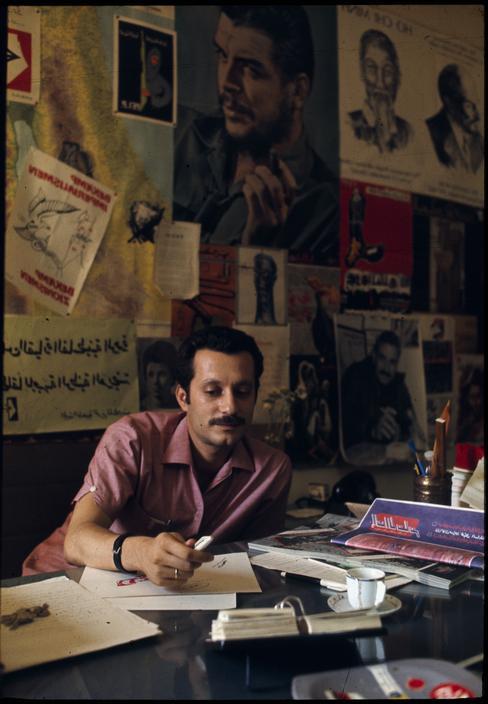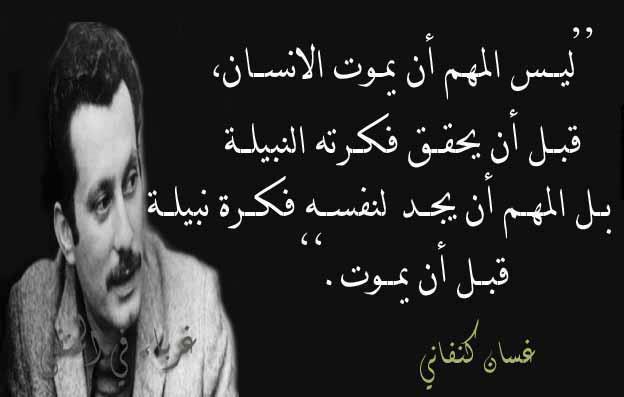Derek Ide I Social Movement Studies I Commentary I July 16th, 2014

Ghassan Kanafani, the famous Palestinian journalist, novelist, and short story writer, whose writings were deeply rooted in Arab Palestinian culture, inspired a whole generation during and after his lifetime
In Beirut on July 8, 1972, thirty-six year old Ghassan Kanafani entered into his Volkswagen for the last time. The prolific writer and editor of Al Hadaf (“The Goal”) was headed to the newspaper’s office. His seventeen year old niece Lamis Najm was with him. Not long before, he had penned these words to her:
“Dearest: You are rising now, while we start to fall. Our role is almost complete. The role of this generation was the shortest for any generation in history. We live in crucial times for the history of humanity and people are divided between participants and spectators… The battle is harsh and human capacity cannot tolerate this much. I, young one, chose not to be a spectator. It means that I chose to live the crucial moments of our history, no matter how short…”[1]
 It was around 11 a.m. that Saturday when the explosion occurred, judging from the watch later found on what remained of Lamis’ hand. [2] Kanafani was a leading member of the Popular Front for the Liberation of Palestine, the heart of the left-wing secular opposition to Israel. He was a noncombatant, and although pictures of Ho Chi Minh and Che Guevara adorned his office, he never personally picked up a gun against his Zionist enemies, despite having every right to resist to the ongoing occupation by whatever means necessary. Yet, he still became a victim of Israeli terror.
It was around 11 a.m. that Saturday when the explosion occurred, judging from the watch later found on what remained of Lamis’ hand. [2] Kanafani was a leading member of the Popular Front for the Liberation of Palestine, the heart of the left-wing secular opposition to Israel. He was a noncombatant, and although pictures of Ho Chi Minh and Che Guevara adorned his office, he never personally picked up a gun against his Zionist enemies, despite having every right to resist to the ongoing occupation by whatever means necessary. Yet, he still became a victim of Israeli terror.The car bomb attached to Kanafani’s vehicle killed him and his teenage niece on July 8, 1972. The assassination was part of a secret operation known as God’s Wrath. The plan, carried out under the tutelage of Prime Minister Golda Meir, was intended to murder leading militants and officials within the Palestinian resistance movement carried out by Israel’s “Institute for Intelligence and Special Operations,” more commonly known as Mossad.
Operation God’s Wrath was a covert operation that utilized methods, such as car bombs, akin to what Arundhati Roy once referred to as the “privatization of war.”[3] Forty-two years later, to the day, after the car bomb killed Ghassan and Lamis, the terrorist state of Israel began a new public operation of a different sort. On Tuesday, July 8, 2014 Israel unleashed Operation Protective Edge onto Gaza, a much more hasbara-friendly initiative. This spectacle of sheer force – conventional terrorism, it might be called – had indiscriminately slaughtered nearly 200 Palestinians within the span of one week.[4] Seven days in and Israel’s casualties had reached a stunning zero.
 Unlike the names of the three Israeli teenage settlers who were kidnapped and murdered not long before Operation Protective Edge was initiated, the names of the 192 victims of Israeli aggression have not yet been plastered on the front pages of every newspaper or the headlines on every television set. Sa’ad Mahmoud al-Hajj was 17, the same age as Kanafani’s niece Lamis, was murdered along with seven members of his family when an Israeli bomb destroyed their home in Khan Younis. Sa’ad’s brother Tarek, age 18, and his sister Fatima, age 12, died with him. Ziad Maher al-Najjar, 17 years old, was also killed in Khan Younis days later. 17-year-old Anas Youssef Kandil was murdered by Israeli terror in Jabalia, and 17-year-old Mohammed Isam al-Batash was killed in Gaza city. 10-year-old Bassim Salim Kawareh, 11-year-old Maryam Atieh Mohammed al-Arja, 12-year-old Qassi Isam al-Batash, all victims of this most recent terrorist attack. These names may not find their way onto the pages or television screens of major news outlets in the west, where Palestinian blood has always been worth less than Israeli blood, but they, along with all the other names of victims of Israeli barbarity, should grace the lips and enter the hearts of those engaged in the struggle for a free Palestine.
Unlike the names of the three Israeli teenage settlers who were kidnapped and murdered not long before Operation Protective Edge was initiated, the names of the 192 victims of Israeli aggression have not yet been plastered on the front pages of every newspaper or the headlines on every television set. Sa’ad Mahmoud al-Hajj was 17, the same age as Kanafani’s niece Lamis, was murdered along with seven members of his family when an Israeli bomb destroyed their home in Khan Younis. Sa’ad’s brother Tarek, age 18, and his sister Fatima, age 12, died with him. Ziad Maher al-Najjar, 17 years old, was also killed in Khan Younis days later. 17-year-old Anas Youssef Kandil was murdered by Israeli terror in Jabalia, and 17-year-old Mohammed Isam al-Batash was killed in Gaza city. 10-year-old Bassim Salim Kawareh, 11-year-old Maryam Atieh Mohammed al-Arja, 12-year-old Qassi Isam al-Batash, all victims of this most recent terrorist attack. These names may not find their way onto the pages or television screens of major news outlets in the west, where Palestinian blood has always been worth less than Israeli blood, but they, along with all the other names of victims of Israeli barbarity, should grace the lips and enter the hearts of those engaged in the struggle for a free Palestine. Thus, forty-two years after the terrorist state martyred Kanafani, its reign of terror continued. The world is a different place from 1972, however, and the voice of worldwide opposition is growing. Just as the movement against apartheid South Africa took decades to build, so did the opposition to the settler-terrorist state of Israel. Today, however, the movement for boycott, divestment, and sanctions (BDS), put forward by Palestinian civil society in 2005, is growing at an even more rapid pace than did its predecessor. Across US campuses, student governments have passed resolutions calling for divestment, and victories in the name of a free Palestine have been on the rise.[5] While the puppet Arab leaders, sheikhs and Israeli pawns wring their hands, donate a pittance of their enormous wealth to clean up the aftermath, and send fighters off to die in Iraq or Syria, they cannot be the face of the Palestinian resistance.
Thus, forty-two years after the terrorist state martyred Kanafani, its reign of terror continued. The world is a different place from 1972, however, and the voice of worldwide opposition is growing. Just as the movement against apartheid South Africa took decades to build, so did the opposition to the settler-terrorist state of Israel. Today, however, the movement for boycott, divestment, and sanctions (BDS), put forward by Palestinian civil society in 2005, is growing at an even more rapid pace than did its predecessor. Across US campuses, student governments have passed resolutions calling for divestment, and victories in the name of a free Palestine have been on the rise.[5] While the puppet Arab leaders, sheikhs and Israeli pawns wring their hands, donate a pittance of their enormous wealth to clean up the aftermath, and send fighters off to die in Iraq or Syria, they cannot be the face of the Palestinian resistance.As Ghassan Kanafani explained: “If we are failed defenders of the cause, it is better to change the defenders, not to change the cause.”

Since his time, the defenders have changed more than once, but Kanafani’s cause lives on. For those of us who live outside the “harsh battle,” we too should “chose not to be a spectator.” Let us, like Kanafani, “chose to live the crucial moments of our history” and contribute to the struggle for a free Palestine. For those of us who face no imminent threat of retaliation, no fear of bombs dropping onto our homes while we eat with our families, no chance of a car bomb detonating as we head to our offices, it should not only be our choice, but our obligation, our duty, to support the movement to boycott and divest from the terrorist state of Israel. As Alice Walker, who refused an Israeli publisher’s offer to publish “The Color Purple,” once said, “Activism is my rent for living on this planet.” Indeed, when it comes to Palestine, it is time for Americans to pay some rent.
Notes
Notes
[2] Ibid.
 Uprooted Palestinian
Uprooted Palestinian 
The views expressed in this article are the sole responsibility of the author and do not necessarily reflect those of the Blog!
